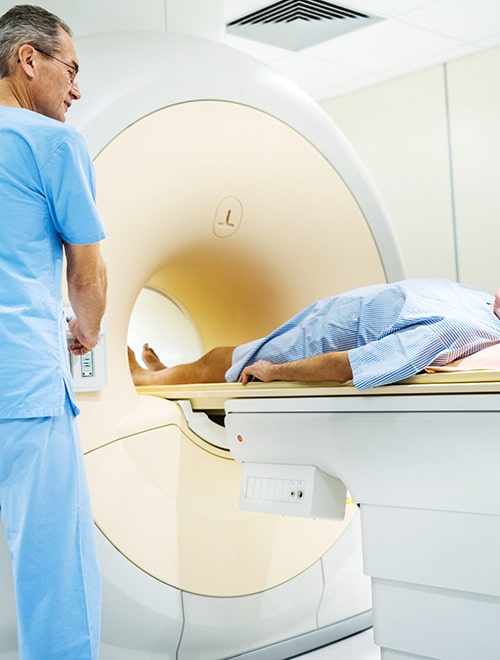- 3 min read
What is recurrent prostate cancer?
Some men treated for prostate cancer may develop recurrent prostate cancer soon after treatment finishes or several years later.
Recurrent prostate cancer, like advanced prostate cancer, is when the cancer has spread outside of your pelvis to other parts of your body – lymph nodes, bones or other areas. When cancer spreads to other parts of the body, it is said to metastasise.
The cancers that occur elsewhere are called metastases.
What are the symptoms of recurrent prostate cancer?
Recurrent prostate cancer does not always cause symptoms. A rise in PSA levels is often the first sign that the disease may be recurring.
If you do experience symptoms, the type of symptoms you get will depend on where the cancer has spread to. If you still have your prostate, you may experience urinary difficulties such as needing to urinate frequently, poor flow, bleeding or discomfort.
If the cancer has spread to your bones, you may experience pain in your lower back, upper thighs, hips or other parts of your body depending on where the cancer has spread to. Recurrent prostate cancer may also cause unexpected weight loss and fatigue. It’s best to always discuss any symptoms you have with your doctor or healthcare team.
Learn more about prostate cancer symptoms by following the link to: Symptoms
What tests diagnose recurrent prostate cancer?
After having treatment for prostate cancer, you will continue to have regular PSA tests. If your PSA test rises, your doctor may recommend other tests to diagnose or rule out recurrent prostate cancer.
Follow the links to find out about the various tests and examinations you may have:
PSA tests
Imaging tests, such as CT and bone scan
PSMA-PET scan
Magnetic resonance imaging (MRI)
Biopsy
What is the outlook for recurrent prostate cancer?
As for advanced prostate cancer, there are many effective treatments for recurrent prostate cancer with new therapies becoming available regularly.
These treatments can help control the growth of your cancer, manage your symptoms and extend your life expectancy, while maintaining good quality of life.
To find out more, follow the link to: Treatments for Advanced Prostate Cancer
Professional support for recurrent prostate cancer
You are likely to be referred to several health professionals with different expertise who work together as a healthcare team (also known as a multidisciplinary team) to help you to live with and manage your experience with prostate cancer.
Your team includes health professionals who are involved in diagnosing your recurrent prostate cancer, recommending and delivering treatment, managing symptoms and side effects, assisting you with treatment rehabilitation, and providing support for you to deal with your emotional and physical health and wellbeing and practical concerns during your cancer experience.
Some of the specialists you may see include:
- Accredited exercise physiologist
- Cancer nurse coordinator
- Continence nurse
- Dietitian
- Endocrinologist
- General practitioner (GP)
- Medical oncologist
- Men’s health physician
- Nuclear medicine physician
- Oncology nurse
- Palliative care specialist or palliative care nurse
- Pathologist
- Pharmacist
- Physiotherapist
- Prostate Cancer Specialist Nurse
- Psychologist
- Radiation oncologist
- Radiologist
- Sex therapist
- Social worker
- Urologist
- Urology nurse
To learn how each of these health professionals may help you, follow the link to: The Role of Medical Specialists
Getting support from others
Learning that your cancer has returned or spread to other parts of your body can be emotionally challenging. It is important you seek support from partners, family and friends, or from professionals.
You can join a prostate cancer support group. It is a way to connect with friendly and helpful people who know what you are going through.
If you are having trouble managing or coping, contact your doctor or a member of your healthcare team. You can also call a PCFA nurse on 1800 22 00 99 to discuss resources or support that are available to you. If you need urgent emotional support call Lifeline on 13 11 44 or Beyond Blue on 1300 22 46 36.
Learn more about looking after your mental health in advanced cancer here: Psychological wellbeing
Key Points
- Recurrent prostate cancer is cancer that has spread to other parts of your body some time after you were first treated
- There may be no symptoms with recurrent prostate cancer or you may have symptoms in the parts of your body that the cancer has spread to
- Tests and examinations can detect that your cancer has spread and diagnose recurrent prostate cancer
- There are many current and evolving treatments for recurrent prostate cancer
- A multidisciplinary healthcare team will support you during your diagnosis, testing and treatment of recurrent prostate cancer
- You can also seek support from loved ones, supports groups and PCFA nurses on 1800 22 00 99






